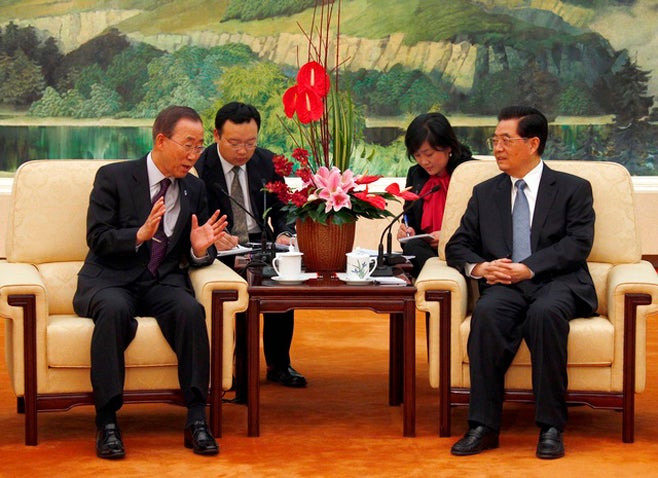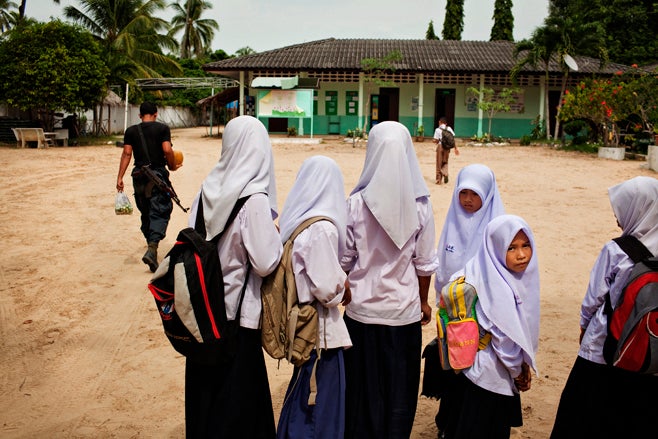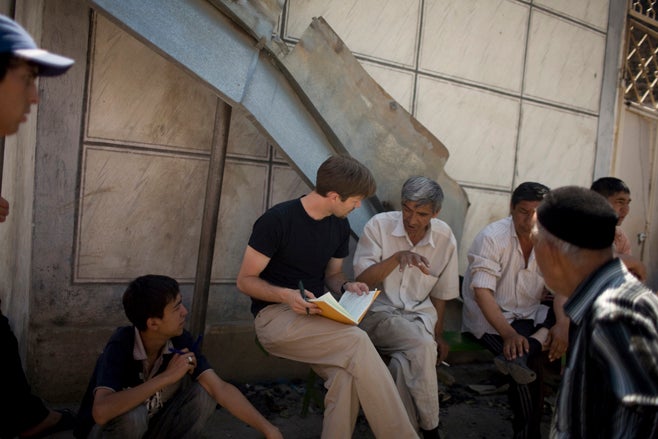The Cambodian government increased its repression of freedoms of expression, assembly, and association in 2010, tightening the space for civil society to operate.
Prime Minister Hun Sen's ruling Cambodian People's Party (CPP) used the judiciary, new laws, and threats of arrest or legal action to restrict free speech, jail government critics, disperse workers and farmers peacefully protesting, and silence opposition party members.
Cambodia also regressed in respecting international rights treaties. In December 2009 the government deported 20 Uighur asylum seekers at risk of torture and mistreatment to China, violating Cambodia's obligations under the 1951 Refugee Convention. The controversial refoulement took place on the eve of a visit by senior Chinese officials that finalized a massive aid package to Cambodia.
Freedoms of Expression, Association, and Assembly
Journalists who criticize the government face biased legal action, imprisonment, and violence. At least 10 opposition journalists have been killed in the past 15 years.
Under a new penal code that came into force in November 2009, government critics who peacefully express views about individuals and government institutions risk criminal prosecution for defamation and disinformation. These include the editor of Khmer Amatak newspaper who was charged in March with defamation and disinformation for a feature on governmental corruption, and the editor of Prey Nokor newspaper, which covers Khmer Krom affairs, who was forced to resign in August. In May authorities banned a public screening in Phnom Penh of a documentary about the 2004 assassination of labor leader Chea Vichea. There was no progress in his murder investigation or that of two other union leaders murdered in 2004.
Pending legislation on nongovernmental organizations and trade unions is expected to further tighten restrictions on freedom of association.
In September tens of thousands of garment workers seeking a higher minimum wage began a legal strike, which union leaders suspended after government officials agreed to negotiate. However, employers suspended or fired more than 200 union leaders and members for their roles in the strike, fueling worker protests.
Authorities continue to forcibly and often violently disperse public protests. A new law allows local officials to ban protests deemed threats to "security, safety, and public order."
Judiciary
The government made no efforts during 2010 to improve the judiciary's impartiality or independence.
Politically motivated court cases continue to target opposition members. In January a provincial court convicted opposition leader Sam Rainsy and two villagers on charges of racial incitement and destroying border demarcation posts. In a closed trial, the court refused to consider defense evidence and sentenced Rainsy to two years in jail in absentia. In September he was sentenced to 10 more years for disinformation and falsifying maps.
The judiciary's lack of independence was further highlighted in August, when the Takeo provincial court convicted four people on unfounded charges of disinformation.
A long-awaited anti-corruption law hastily passed in March, with little time for public comment. The government threatened to expel the UN resident coordinator when UN agencies called for more public debate on the law, which lacks adequate protections for whistle-blowers and fails to ensure independence for legally-created anti-corruption agencies.
Arbitrary Detention and Torture
Police and military police routinely use torture to extract confessions from detainees. Courts fail to address the illegal torture and use coerced confessions to convict the accused. The Cambodian League for the Promotion and Defense of Human Rights (LICADHO) received reports of 60 cases of torture in the first half of 2010 alone.
More than 2,000 people were arbitrarily detained in 11 government drug detention centers. Mandated to treat and "rehabilitate" drug users, the centers subject detainees to violence (including electric shocks and whippings), forced labor, and military-style drills. Many detainees are children and people with mental illnesses. In December 2009, 21 drug users were illegally detained and forced to test an unregistered Vietnamese herbal formula purported to "cure" drug dependence.
Women and girls, including transgender women, involved in sex work face beatings; rape; sexual harassment; extortion; arbitrary arrest; and detention by police, government-hired security guards, and employees in social affairs centers. A 2008 law on trafficking and sexual exploitation criminalizes trafficking but also makes "solicitation" illegal, exposing sex workers to arbitrary detention and abuse. Police crackdowns on "trafficking" focus on closing brothels and arbitrarily detaining sex workers rather than prosecuting traffickers.
Homeless children, families, beggars, the mentally ill, and other indigent people gathered in police sweeps are also detained and mistreated in government social affairs centers.
Cambodia's prisons continue to be overcrowded and lack sufficient food, water, sanitation, and healthcare. Prey Veng prison experienced a major cholera outbreak in July, while 15 prisoners in Kampong Thom, who tried escaping in early 2010, were shackled to iron bars for over a month.
Land Confiscation and Forced Evictions
Illegal land confiscation and forced evictions continue to escalate. During the first half of 2010, more than 3,500 families - approximately 17,000 people - were newly affected by land grabbing, according to a survey of 13 of Cambodia's 24 provinces by LICADHO.
Land rights activists faced violence and arrest, with more than 60 people imprisoned or awaiting trial for protesting forced evictions and land grabbing.
In Kampong Speu, more than 800 families had their land confiscated due to sugar concessions granted to a CPP senator. Soldiers, military police, and courts facilitated the arrest and charging of farmers protesting seizure of their land.
In January company guards and soldiers from Brigade 31 wounded at least four people when they forcibly evicted 116 families from their land in Kampong Som which is slated for development by a Chinese-owned company. Using military force to conduct evictions is illegal in Cambodia.
Land conflicts affecting indigenous peoples continue unabated. In March the United Nations Committee on the Elimination of Racial Discrimination criticized the government for granting numerous concessions on indigenous peoples' lands without their consent and harassing peaceful protesters. In Kampong Speu, a Singaporean concession holder partnered with PM Hun Sen's sister to oversee the clearing of farmland belonging to indigenous Suy people, threatening the resource base of 350 families.
On April 26, unknown assailants in Battambang shot and killed community activist Pich Sophan, who had led fellow villagers to contest military confiscation of their land, and was a witness to the April 4 shooting of fellow activist Sim Mey. Mey survived but was jailed in May on charges of destruction of property.
Khmer Rouge Tribunal
In July the Extraordinary Chambers in the Courts of Cambodia (ECCC), the UN-backed Khmer Rouge tribunal, sentenced the former chief of Tuol Sleng (S21) prison, Kaing Gech Eav, known as Duch, to 35 years in prison for crimes against humanity and war crimes. He faces just 19 more years because of time served and deducted for his illegal detention before his transfer to the ECCC.
In September the tribunal announced indictments for four other former Khmer Rouge leaders in custody. Charges against them include genocide, crimes against humanity, torture, and murder. Despite the international co-prosecutor's submission of six additional suspects for indictment, Hun Sen continued to publicly oppose further trials beyond the five persons in custody and reiterated this view to the UN Secretary General during a meeting in October.
Refugees and Asylum Seekers
Asylum seekers, especially from Vietnam and China, face forced repatriation in violation of the Refugee Convention. Uighurs were forcibly returned to China three days after Hun Sen signed the refugee sub-decree.
The authorities also refused asylum for Khmer Krom (ethnic Khmers from southern Vietnam) who fled to Cambodia from Vietnam. Despite promises to treat Khmer Krom as Cambodian citizens, authorities failed to grant many Khmer Krom citizenship and residence rights, including 24 who were deported to Cambodia in December 2009 after a failed asylum bid in Thailand. In February 2010 authorities rejected the group's request to receive documents needed to rent housing, get jobs, and access healthcare, education, and other services.
Key International Actors
In June Cambodia's donors pledged US$1.1 billion in development aid for 2010. Years of donor funding for judicial reform have had little effect. Japan, Cambodia's largest donor and the single largest funder of the ECCC, maintained its practice of not publicly confronting the government about its rights violations. China, another major investor and donor, continued to increase aid to Cambodia with no conditions made to improve human rights.
Besides supporting rule of law, health, and human rights projects, the United States continued to aid and train Cambodia's armed forces - including units with records of serious rights violations such as Brigade 31, Battalion 70, and Airborne Brigade 911 - in violation of the Leahy law. Responding to the deportation of Uighur asylum seekers in April, the US cancelled shipment of 200 surplus military trucks to Cambodia. In July US-funded regional peacekeeping exercises took place on land transferred from a military unit involved in illegal land seizures.
In August the European Union convened its first public consultations in Cambodia with civil society ahead of its annual rights dialogue with the government. Rights groups criticized the EU's tax-free policy for imported Cambodian sugar, some of which is grown on plantations that have displaced thousands of rural Cambodians.
In March Cambodia officially accepted all 91 recommendations that UN member states made during the Universal Periodic Review of its rights record by the UN Human Rights Council. Yet when the country representative from the UN High Commissioner for Human Rights criticized the deportation of two Thais in June the government threatened to expel him. According to the Foreign Minister, Hun Sen demanded the expulsion of the representative and closure of the office in a meeting with the UN Secretary General in October. In September a report by the special rapporteur on human rights in Cambodia strongly criticized the lack of judicial independence.



